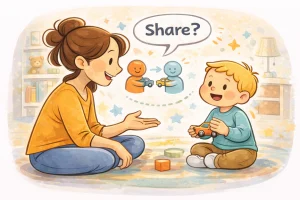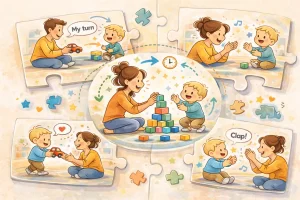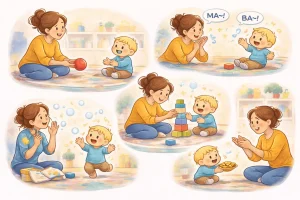Should My 4-Year-Old Be Talking More Clearly by Now?
Last Updated: September 4, 2025
As a parent, you’ve probably been listening closely to every word your child says — and sometimes, every word they don’t say clearly. By age four, most children can speak in full sentences, use basic grammar correctly, and make themselves understood about 75% of the time, even to strangers. But what if your 4-year-old’s speech still sounds unclear, jumbled, or hard to follow?
Should my 4-year-old be talking more clearly by now? This is one of the most common questions speech-language pathologists hear from parents. Understanding 4-year-old speech milestones, including vocabulary growth, sentence complexity, and pronunciation, can help you figure out whether your child’s talking is on track — or if it’s time to give them a little extra support.
Free Speech Help for Kids
Concerned about speech delays? Book a free consultation with our expert speech therapist and get guidance tailored to your child’s needs.
Understanding Speech Development at Age Four
By the time children reach their fourth birthday, their communication skills typically take a big leap forward. This stage is often referred to as a key milestone year for language and clarity — a time when your child’s talking is not just about saying words, but about communicating ideas, asking questions, and connecting with others.
What to Expect at This Age
1. Speaking in Full Sentences
Most 4-year-old speech milestones include the ability to speak in full sentences at 4 years — often four to six words long or even more. Instead of saying “Want cookie,” a four-year-old might say, “I want a cookie because I’m hungry.” This is a big step in talking development for four-year-olds because it shows they can organize their thoughts and use connecting words like “because,” “so,” and “when.”
2. Using Correct Grammar Markers
Another important sign of progress is the use of grammatical markers in preschool speech. By this age, many children can use past tense (“played”), plurals (“dogs”), and possessives (“my friend’s toy”) correctly most of the time. You might still hear the occasional mix-up — and that’s normal — but consistent grammar use shows that your child’s language is maturing.
3. Asking ‘Why,’ ‘When,’ and ‘How’ Questions
One of the most exciting developments at this age is the increase in sentence complexity in preschoolers. Your child may begin asking lots of “why,” “when,” and “how” questions as they become curious about how the world works. These question forms require advanced sentence structures and a growing vocabulary, both of which are essential for later reading and academic skills.
Know more: How to Help Your Child Answer WH Questions with Confidence
Why These Skills Matter
These abilities don’t just make your child easier to understand — they help them express emotions, tell stories, and share ideas with friends and teachers. Strong communication at this age also supports social skills, emotional regulation, and school readiness.
If your child is not yet meeting some of these 4-year-old speech milestones, it doesn’t always mean there’s a serious problem. Every child develops at their own pace, but knowing these benchmarks can help you decide if a little extra support might be helpful.
How Clearly Should a 4-Year-Old Talk?
By the time a child turns four, their speech should be clear enough that most people can understand them — not just their parents. This clarity is known as speech intelligibility, and it’s an important part of overall communication skills.
Expected Speech Intelligibility Benchmarks
- To parents and familiar people: Parents can usually understand nearly everything their four-year-old says. Small mispronunciations might still happen, but the meaning should be obvious in most conversations.
- To strangers: Even people who don’t spend much time with your child should understand about 75–90% of what they say. If your child’s speech is frequently misunderstood by others, it could be a sign to monitor their progress more closely.
These percentages are not hard rules, but they provide a useful guide for what’s typical at this age.
Pronunciation Expectations at Age Four
In terms of phonological development in preschool, most four-year-olds can correctly pronounce early-developing sounds like p, b, m, n, t, d, k, g, f, h, and y. They may still be working on trickier sounds like s, r, l, sh, ch, and th — these often take longer to master and may develop closer to ages 5–7.
You might hear your child substitute one sound for another (“wabbit” instead of “rabbit”) or leave off certain sounds in longer words. These patterns are usually part of normal development and fade as their speech skills mature.
Examples of Common Sound Errors at This Age
- ‘Th’ substitutions: Saying “dis” for “this” or “fink” for “think”
- ‘R’ substitutions: Saying “wun” for “run” or “wabbit” for “rabbit”
- Simplifying blends: Saying “poon” for “spoon” or “geen” for “green”
- Dropping final sounds: Saying “ca” for “cat” (less common by age four but still possible)
These errors are often part of a child’s natural progression in speech and are not necessarily a cause for concern — unless they make your child hard to understand or persist well past the expected age range.
Why Speech Clarity Matters
Clear speech at this stage helps children express their needs, share ideas, and build friendships more easily. It also sets the foundation for later literacy skills like reading and spelling. If your four-year-old’s speech is much less clear than expected for their age, a simple consultation with a speech-language pathologist can provide guidance and reassurance.
Signs Your Child May Need Speech Support
Every child develops at their own pace, but by age four, there are certain skills most children have mastered. If your child is falling noticeably behind in multiple areas, it might be worth seeking advice from a speech-language pathologist. Recognizing these early signs can make a big difference in helping them catch up.
1. Difficulty Forming Complex Sentences
At this age, most children can put together longer, more detailed sentences — often using connecting words like “because,” “so,” and “when.” If your child is still mostly speaking in short, simple phrases, it could point to challenges in sentence complexity in preschoolers. For example, saying “I go park” instead of “I went to the park because I wanted to play” shows they may not yet be structuring sentences at the expected level.
2. Limited Vocabulary Growth
By four years old, children typically know hundreds of words and learn new ones almost daily. Strong vocabulary growth at age four includes naming common objects, describing actions, and using words to express feelings. If your child’s vocabulary hasn’t expanded much in the last six months, or they struggle to recall or use words they’ve heard before, it might be a sign of a language delay.
3. Struggling to Follow Multi-Step Instructions
A typical four-year-old can usually follow two- or three-step directions without extra help. For example, “Please put your shoes in the cupboard, wash your hands, and come to the table.” If your child regularly forgets steps or gets confused, it may be linked to listening comprehension or processing difficulties — both of which can affect speech and language development.
4. Avoiding Conversations
It’s normal for some children to be shy, but if your child avoids talking altogether or gets frustrated when trying to communicate, it’s worth paying attention. You might wonder, “Is it normal if my 4-year-old isn’t talking much?” While some variation is expected, avoiding conversations could signal that your child is aware of their speech difficulties and feels self-conscious — or that they’re struggling to keep up with peers.
When to Take Action
If you notice one or more of these signs consistently, consider scheduling a developmental screening. Early intervention can greatly improve a child’s communication skills and confidence, helping them thrive socially and academically.
Causes of Speech Clarity Issues at Age Four
If your 4-year-old’s speech isn’t as clear as you expected, it’s natural to wonder why. The truth is, speech clarity can be influenced by many different factors — some temporary, others requiring extra support. Understanding these possible causes can help you decide the best next step for your child.
1. Speech Sound Disorders
One common reason for unclear speech at this age is a speech sound disorder, such as a phonological delay. This means your child may still be using speech patterns typical of a younger child, like leaving off certain sounds or replacing one sound with another. For example, saying “tat” instead of “cat” or “wabbit” instead of “rabbit.”
While some sound substitutions are normal in preschoolers, a persistent pattern beyond the expected age range might need the attention of a speech-language pathologist.
2. Hearing Loss or Ear Infections
Clear speech depends on hearing sounds accurately. Frequent ear infections or undiagnosed hearing loss can make it harder for your child to hear certain speech sounds — and if they can’t hear them clearly, they may have trouble producing them correctly. Even mild hearing issues can affect how they develop speech and language skills. A hearing check can quickly rule this out or confirm if extra support is needed.
3. Developmental Delays
Sometimes, unclear speech is linked to broader developmental differences. This could include delays in motor skills, language comprehension, or social communication. Developmental delays don’t always mean there’s a serious or lifelong issue — but they can impact how quickly a child reaches speech milestones like using complex sentences or pronouncing harder sounds.
4. Bilingualism and Normal Variation in Speech Development
If your child is learning more than one language, you may notice differences in pronunciation or grammar as they switch between languages. This is a normal part of bilingual development and not necessarily a problem. Similarly, some children develop speech skills a little earlier or later than average, even within the same family. As long as they’re making steady progress, slight variations in timing are usually nothing to worry about.
Takeaway for Parents
Not all speech clarity issues are signs of a serious problem — but knowing these common causes can help you take a proactive approach. If you’re unsure whether your child’s talking is on track, a speech-language evaluation can offer peace of mind and a clear plan forward.
What Parents Can Do to Help
As a parent, you play the most important role in supporting your child’s speech development. The good news? You don’t need special equipment or complicated programs — just consistent, everyday interactions that make talking fun and meaningful. Here are some simple but powerful ways to help your child’s speech become clearer and more confident.
1. Daily Language-Building Activities
The best way to boost vocabulary in preschoolers is through regular, natural conversations. Talk about what you’re doing during daily routines — whether it’s making breakfast, going for a walk, or getting ready for bed. Name objects, describe actions, and use a variety of words.
For example, instead of just saying, “Put on your shoes,” you could say, “Let’s put on your red shoes so we can go outside and play.” This adds descriptive language and helps your child learn new words in context.
2. Reading, Storytelling, and Pretend Play
Reading aloud every day exposes your child to new vocabulary, sentence structures, and ideas. Choose books with simple storylines and colorful pictures, and encourage your child to predict what will happen next or retell the story in their own words.
Storytelling and pretend play — like playing “shop,” “doctor,” or “teacher” — help children practice using longer sentences and imaginative language, both of which are essential for strong speech development at 4 years.
Also read: Boost Kids Storytelling Skills: Engage and Educate at Home
3. Encouraging Back-and-Forth Conversations
Conversations are more than just talking — they’re about taking turns, listening, and responding. Ask open-ended questions instead of yes/no ones, like, “What was your favorite thing we did today?” This encourages your child to use longer answers and practice sentence-building.
Be patient and give them time to respond, even if it takes a few seconds. These moments build confidence and help them feel that their words matter.
4. Practicing Sounds Through Games
If you’re wondering how to help a 4-year-old speak more clearly, playful practice can make a big difference. Try tongue twisters, rhyming games, or silly sound repetition (like “pa-pa-pa” or “ra-ra-ra”). You can even turn it into a scavenger hunt — asking your child to find objects that start with a target sound.
Keep it lighthearted and avoid correcting too harshly; instead, model the correct pronunciation in your reply.
The Power of Consistency
Small, daily efforts add up over time. Even 10–15 minutes of focused language play each day can help your child make noticeable progress. By combining vocabulary growth, storytelling, conversation practice, and playful sound work, you’re giving them the tools to express themselves more clearly and confidently.
When to Seek Professional Help
It’s natural to wonder, “When should I worry if my 4-year-old isn’t talking clearly?” The truth is, some variation in speech development is completely normal — but there are certain signs that suggest it’s time to seek guidance from a speech-language pathologist.
Signs You Should Contact a Speech-Language Pathologist
- Your child’s speech is difficult for even family members to understand.
- Strangers understand less than 75% of what your child says.
- They struggle to form complete sentences or use basic grammar for their age.
- Vocabulary growth has slowed, or they often use very simple words for most things.
- They show frustration, avoid speaking, or withdraw from conversations.
- You notice ongoing pronunciation issues with many sounds, not just tricky ones like “r” or “th.”
If one or more of these signs is present, a professional evaluation can provide clarity and direction.
Why Early Intervention Matters
Speech therapy for preschoolers works best when started early. At age four, children’s brains are especially responsive to language learning and sound correction. Early support can:
- Improve speech clarity and pronunciation before school starts.
- Expand vocabulary and sentence structure for better communication.
- Boost confidence in social situations and with peers.
- Reduce the risk of later reading and writing difficulties.
Even a short period of therapy can make a noticeable difference when targeted to your child’s needs.
Reassurance for Parents
Seeking help doesn’t mean there’s something “wrong” with your child — it means you’re giving them the tools they need to succeed. Many children make rapid progress with just a few months of focused support, and you’ll get strategies to continue helping them at home.
If you’re unsure whether your child’s speech is on track, a consultation is a low-stress way to get answers and peace of mind.
Conclusion
Every child develops speech at their own pace. While many reach 4-year-old speech milestones like speaking in full sentences and using clear words, others may still be learning — and that’s often normal. If you’re asking, “Should my 4-year-old be talking more clearly by now?”, look for steady progress in talking development for four-year-olds. Give your child daily chances to talk, read, and play with words. If you have concerns about speech development at 4 years, a speech-language pathologist can guide you. With support, practice, and patience, your child can grow into a confident, clear communicator.
Frequently Asked Questions:
1. Is it normal for my 4-year-old to not speak clearly?
Yes, it can be normal for a 4-year-old to still have some speech errors. Many children at this age substitute certain sounds, like saying “wabbit” instead of “rabbit” or “fink” instead of “think.” These are called developmental sound errors and are part of growing speech skills. However, by age four, most people — even those who don’t know your child — should be able to understand 75–90% of what they say. If your child’s speech is much less clear than this, it may be worth speaking to a speech-language pathologist.
2. What should a 4-year-old’s speech sound like?
By four years old, children are expected to use full sentences, often four to six words long or more, and their grammar should be mostly correct. They should be able to use past tense words like “played,” plurals like “dogs,” and possessives like “my friend’s toy.” They should also pronounce most early-developing sounds — like p, b, m, n, k, and g — clearly. While they may still be learning harder sounds like “r,” “l,” and “th,” their speech should be easy to follow in everyday conversation.
3. When should I worry if my 4-year-old isn’t talking clearly?
You should consider seeking professional advice if:
- Strangers understand less than 75% of what your child says.
- Your child speaks mostly in short, simple phrases instead of full sentences.
- They have a limited vocabulary compared to other children their age.
- They avoid speaking or get frustrated when trying to communicate.
Early support can make a big difference in speech development at 4 years, so trust your instincts and act if you have concerns.
4. How many words should my 4-year-old know?
While there’s no exact number, most 4-year-old speech milestones include knowing hundreds of words. They should be able to name everyday objects, describe actions, talk about feelings, and tell short stories about their day. Vocabulary growth at this age is fast — many children learn new words almost daily. If your child’s vocabulary has not grown much in the past six months, it could be a sign they need extra support.
5. What are common speech problems in 4-year-olds?
Some common issues at this age include:
- Sound substitutions – “w” for “r” (wabbit for rabbit)
- Omitting sounds – “ca” for “cat”
- Simplifying blends – “poon” for “spoon”
- Trouble with tricky sounds – “r,” “l,” “s,” “sh,” “th”
While many of these are part of normal phonological development in preschool, if they continue well past the expected age or make your child’s speech hard to understand, a speech assessment may be needed.
6. How can I help my 4-year-old speak more clearly?
You can support your child by:
- Reading books together every day.
- Talking during daily routines (e.g., “Let’s wash your hands with soap and warm water”).
- Playing pretend games that encourage conversation.
- Practicing target sounds through fun games, rhymes, or songs.
The key is to model clear speech rather than correcting too harshly. When your child says “wabbit,” you can respond, “Yes, it’s a rabbit!” This keeps communication positive and encourages learning.
7. Can ear infections affect my child’s speech clarity?
Yes. Frequent ear infections can cause temporary hearing loss, which makes it harder for children to hear certain speech sounds. If they can’t hear sounds clearly, they may have trouble producing them correctly. Even mild, repeated hearing issues can slow down talking development for four-year-olds. If you suspect this could be affecting your child, a hearing test can provide answers.
8. Does being bilingual affect speech clarity?
Children learning two languages at the same time may mix words, grammar, or sounds in the early years. This is called code-switching and is a normal part of bilingual development. Speech clarity might take slightly longer to develop, but with consistent exposure to both languages, most children catch up quickly. Being bilingual does not cause long-term speech delays.
9. What is speech therapy for preschoolers like?
Speech therapy for preschoolers is designed to be fun and engaging. Sessions may include picture cards, toys, songs, and games to encourage children to practice sounds, build vocabulary, and form longer sentences. The therapist will also teach you ways to support your child’s speech at home, so progress happens faster.
10. Can speech delays affect school learning?
Yes. If a child enters school with unclear speech or limited vocabulary, it can make reading, spelling, and classroom participation harder. They may struggle to sound out words, answer questions, or feel confident speaking in front of others. Addressing speech clarity before school starts can improve academic performance and social confidence.
About the Author:
Anuradha Karanam
Speech-language pathologist (7+ years of experience)
Anuradha Karanam is a skilled speech-language pathologist with over 6 years of experience. Fluent in Tamil, Telugu, Hindi, and English, she specializes in parent counseling, speech sound disorders, fluency assessment, and speech-language evaluations. Anuradha excels at working with children with developmental disorders, offering creative and effective therapy programs. Currently, at Wellness Hub, she holds a BASLP degree and is registered with the RCI (CRR No A85500). Her patience, ambition, and dedication make her a trusted expert in her field.
Book your Free Consultation Today
Parent/Caregiver Info:
Client’s Details:
* Error Message









